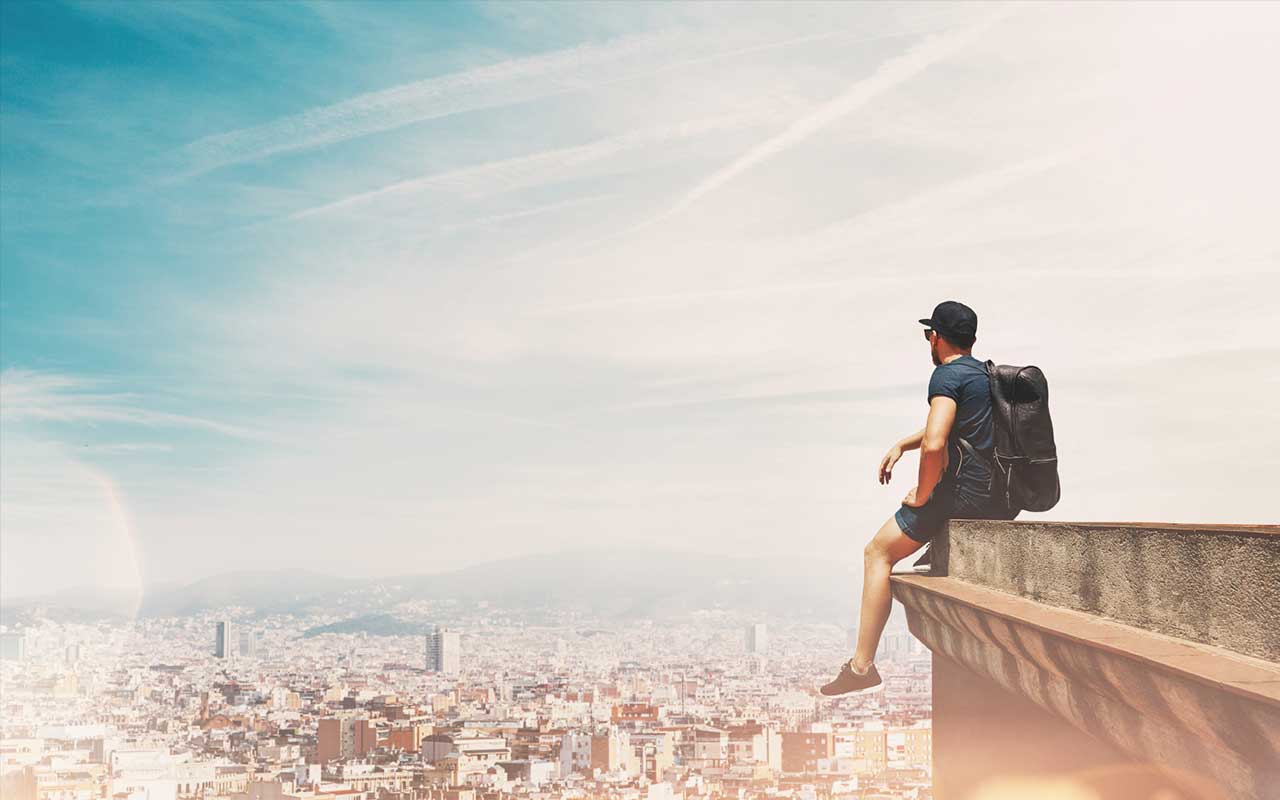Swallows and Amazons: 5 ways to have your own outdoor adventure in the UK
Saturday, August 20, 2016
With the adventure-packed summer film Swallows and Amazons hitting cinemas today, and the school holidays in full swing, there’s no better time to kindle children's sense of adventure and take them out for a fun-filled family adventure. Discover hidden caves and perfect camping spots, or take the Walker children's boating experience in Arthur Ransome’s story to the next level.
Cruise the broads
Get back to nature on a guided bushcraft canoe trail on the Norfolk Broads. Spend daylight hours discovering the channels and backwaters of the Broads best accessed by canoe, before setting down for the night with your freshly learned survival skills, including fire-lighting and cooking over an open fire. A two day expedition costs £125 for children over the age of eight and £175 for adults with The Canoe Man.
Rich pickings
There's no need for scrumping when there are plenty of other ways to fill up on the season's best produce. Wild Food UK (wildfooduk.com) runs foraging courses around the country, where you can learn to identify edible plants and fughi, from around £17.50 for children and £35 for adults. Alternatively, head to a pick-your-own farm such as Roundstone in West Sussex (roundstonefarm.co.uk), where you can park up for the day, grab a basket, and forage in the fields. Summer months will see many farms growing strawberries, blackberries and raspberries ripe for the picking.
Crawl into new spaces
The Yorkshire Dales are known for their scenic beauty, but there’s a whole new world to discover if you head underground. Anyone aged seven and up is able to don a helmet and head-torch and walk (or crawl) through the natural caves in the Pennines, encountering everything from mud to underground waterfalls along the way. There are even hot showers and changing rooms to get cleaned up in at the end of the day. How Stean (howstean.co.uk) offers half a day of caving for £45 per person.
Pitch up
Swallows and Amazons takes place in the Lake District, so what better way to walk in John, Susan, Titty (renamed Tatty in the new film) or Roger’s shoes than by camping out there? Among the many sites to choose from there is the option to be near a busy town such as Keswick or the chance to choose a far quieter area like Eskdale. The truly adventurous can try wild camping in the national park, too – though you do have to check the land owner's permission before pitching up for the night. Pitchup.com has various options in the Lakes, including The Quiet Side, between Grasmere and Elter Water, which has grass pitches from £15.
Stand tall
The children of Ransome’s story may have used dinghies to get to their island, but there’s another way to explore on the water. Stand up paddle-boarding is exactly what the name suggests - the board being something akin to those used in surfing, but it's much easier to get the hang of. Try finding your sea legs on an SUP tour around Wales's stunning Gower coastline with Stand Up Paddle Gower (supgower.com; from £45 per person).
Wednesday, August 10, 2016

I’m not looking for a wi-fi free zone or some far-flung corner of the globe without network coverage. I’m not trying to escape from my iPad, email, games or online shopping... No, I just want to escape other people.
And so it was, at 6.30 on the morning of 6 July, after a 90-minute ferry ride from Kamiros Scala, on the south-eastern tip of Rhodes, I found my slice of heaven: the island of Halki, a rare gem, embellished with neo-classical buildings in rich colours of ochre, burnt umber and red.
As we drifted into the harbour I could see a couple of restaurants, a grocery store, an ATM and a post office – and little else, apart from fishing boats bobbing on the crystal clear waters.
I was met by Janis, who owns a little travel agency, Zifos, and we made our way up the gently winding tracks to Villa Evi, a traditional Greek house high up on the hills with breathtaking views across the bay. With my bags unpacked, I set off for the beach.

But back to the beach: the road to the sea skirts around a beautiful church – one of the few blue and white buildings on the island – and cemetery, where families are obliged to disinter and wash the bones of their loved ones after a few years and move them to a mausoleum to make way for the newcomers.
The beach taverna at Pondamos puts on a superb lunch and stays open late on Fridays for supper. My preferred spot for an evening meal was Valantis, down on the harbor, which served some of the finest grilled feta I’ve ever eaten, along with kefalotyri cheese and souvlaki.
Top tip for fellow crowd-dodgers: avoid Pondamos on Tuesdays as a nearby island puts on a day trip and the place is mobbed. Reserve Tuesdays for walking; there are some excellent paths to follow (pick up a map for €5 at Petros’s general store).
I don’t believe I have ever felt so relaxed or refreshed by a holiday; the peace and tranquility were intoxicating, the villa charming and unpretentious, the locals incredibly friendly, and the water was the clearest and bluest I have ever seen. It was with a heavy heart that I packed my bags to leave Halki for my next destination. The only remedy? Booking a villa for next year.
Back on Rhodes, and not a million miles from Faliraki, is Ixia, a much smaller resort on the western tip of the island. I was staying in the Atrium Plantinum, a luxury hotel that’s been exquisitely designed by a local architect, with the pool taking pride of place. After the peace of Halki I was worried about being around too many people, but even though I wasn’t the only guest, the hotel never felt crowded, with ample space between sunloungers, and even the tables in the restaurant.
In the quest to locate other tucked-away treasures on Rhodes I travelled to the tiny fishing village of Haraki, on the south-eastern side of the island, just above Lindos, on the Mediterranean. The pebbly shore is lined with a few tavernas, shops and holiday apartments, and in peak season the beach road is closed to traffic, allowing visitors to promenade along the seafront.

Established on the beachfront in 1932, it has been passed down through the generations to current son Kozas, who wears a black gown and apron and, oddly, is barefoot at all times. Several locals with weathered faces line his bar, quite possibly the same people who carry cases to the studios, clean the apartments and fetch the fish in the early morning. Nothing much happens here and that’s the way the people of Stegna – and I – like it. I used to think of Rhodes and bristle at the thought of Faliraki but I’ve discovered there are some stunningly quiet places to escape to too.
Wednesday, August 3, 2016

A Yes, I have heard of this before, and indeed have been involved in just such an event. To qualify for delay compensation under the European passengers’ rights rules, known as EC261, you need to arrive three hours late at your destination.
The crucial issue in deciding whether or not you is not what time you left, but what time the plane reached the gate at Madeira’s airport and the door was opened. If it was three hours or more after the scheduled arrival – i.e. at or after 1.05pm – then you could be entitled to €400 in compensation. If it was 1.04pm or earlier, then you have no such right. From Monarch’s response, I infer that the latter applies.
On many occasions it is possible for a plane to be delayed for three hours-plus, but arrive less than three hours late. Schedules are usually “padded”, i.e. with an extra 10 or 20 minutes added to allow for delays such as air-traffic control restrictions.
In addition pilots can fly faster than normal to make up time, and if it saves the airline owing every passenger €400 then it may well be a decision the captain takes.
I was on a delayed British Airways plane from Dublin to Heathrow that was three hours, 10 minutes late in leaving. But since that meant a take-off at midnight, the captain knew he would be cleared to land without a wait at Heathrow because there would be no other traffic at 1am. We arrived “only” two hours and 50 minutes late, and BA escaped the obligation to pay compensation.












